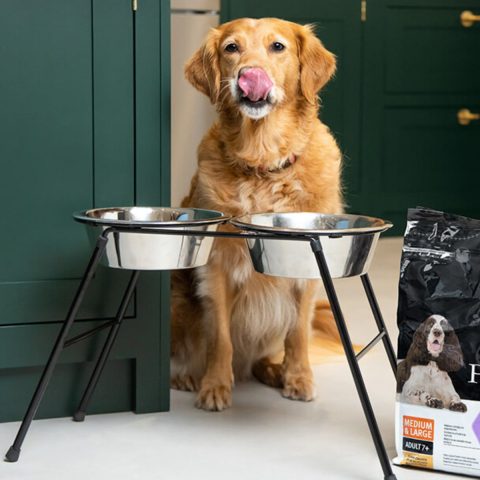You might be surprised to learn that senior dogs have different nutritional needs than their younger counterparts, and what worked for them as puppies might not cut it as they age. As your furry friend grows older, their metabolism slows, and their bodies start to break down protein more efficiently. But what does this mean for their diet, and how can you support their meals to provide them with the nutrients they need to thrive? By learning the right nutrition tips, you can make a significant difference in your senior dog’s health and quality of life – and we’re about to explore three essential tips to get you started.

Feed the Right Protein Sources
As your senior dog ages, prioritizing protein sources that cater specifically to their unique nutritional needs is vital. This is because senior dogs require a different balance of nutrients compared to their younger counterparts. You see, as dogs age, their bodies undergo physiological changes that affect their digestive system, kidneys, and muscle mass. It’s imperative to provide protein sources that support renal health and muscle maintenance.
High-quality protein from animal sources, such as chicken, beef, or fish, is ideal for senior dogs. These protein sources are easily digestible and provide essential amino acids that support muscle maintenance. Additionally, they are rich in antioxidants, vitamins, and minerals that promote overall health. Feeding your senior dog the right protein sources can help manage kidney disease, a common health issue in aging dogs. Look for dog food that lists a named protein source as the first ingredient and avoid fillers or by-products. By making informed decisions about your dog’s protein intake, you can greatly improve their quality of life as they age.
Manage Weight With Fiber Content
Since senior dogs are prone to weight gain, which exacerbates joint issues and increases the risk of chronic diseases, you’ll want to manage their weight by ensuring their diet contains adequate fiber content. Fiber plays a vital role in maintaining a healthy weight, as it helps regulate digestion and satiety. A high-fiber diet can also promote fiber absorption, which supports gut health. This is particularly important in senior dogs, as their digestive system may become less efficient with age.
When selecting a dog food, look for formulas with a balanced fiber content, ideally between 2% to 4% on a dry matter basis. You can also consider adding fiber-rich ingredients, such as sweet potatoes, carrots, and green beans, to their meals. However, be cautious not to overdo it, as excessive fiber can lead to digestive upset. By incorporating the right amount of fiber into your senior dog’s diet, you’ll be supporting their overall health and well-being.
Add Omega-3 for Joint Health
You can greatly alleviate your senior dog’s joint pain and inflammation by adding omega-3 fatty acids to their diet. As your dog ages, their joints naturally deteriorate, leading to discomfort and stiffness. Omega-3 fatty acids, particularly EPA and DHA, have potent anti-inflammatory properties that can substantially reduce joint pain and improve mobility. Furthermore, omega-3 fatty acids also support brain function, which is essential for maintaining your dog’s cognitive health as they age. Additionally, omega-3 fatty acids promote healthy skin and coat, reducing the risk of skin issues and allergies. When selecting a supplement or food rich in omega-3 fatty acids, look for products that contain krill oil, fish oil, or flaxseed oil. You can add these supplements to your dog’s meal or feed them foods that are naturally rich in omega-3 fatty acids, such as salmon or flaxseeds. By incorporating omega-3 fatty acids into your senior dog’s diet, you can improve their overall health and well-being, ensuring they remain happy and comfortable in their golden years.
Frequently Asked Questions
Can Senior Dogs Have People Food as Occasional Treats Safely?
You might be wondering if it’s safe to give your senior dog occasional table scraps or human snacks as treats. Generally, yes, but be cautious, as some human foods can be toxic or cause digestive issues in dogs.
How Often Should I Rotate My Senior Dog’s Food for Variety?
You should rotate your senior dog’s food every 2-3 months to minimize Food Sensitivity, ensuring a varied diet without disrupting Meal Frequency, and allowing their taste buds to adapt to new flavors and nutrients.
Are There Specific Nutrients for Dental Health in Senior Dogs?
As you pamper your senior dog, you’re probably wondering about specific nutrients for their dental health. Look for food or dental chews containing vitamin D, calcium, and phosphorus to support gum health and a healthy, happy smile!
Can I Prepare Homemade Meals for My Senior Dog Instead?
You can prepare homemade meals for your senior dog, using fresh ingredients and careful meal planning to provide a balanced diet, but be sure to consult with a veterinarian or canine nutritionist to avoid nutritional deficiencies.
Do Senior Dogs Require More Water Intake Than Younger Dogs?
As you care for your senior dog, you’re right to wonder if they need more water; the answer is yes, since aging kidneys make it harder for them to concentrate urine, and good water quality is essential for their overall health.
Conclusion
You’ve learned the three essential nutrition tips for senior dogs, but you might be thinking, “My senior dog is a picky eater, and I’m not sure they’ll adapt to these changes.” Don’t worry, start by introducing small amounts of the new protein sources, fiber, and omega-3 fatty acids into their current diet, and gradually increase the proportion over time. With patience and consistency, your senior dog will thrive on their new, balanced diet, and you’ll notice improvements in their health and well-being.
